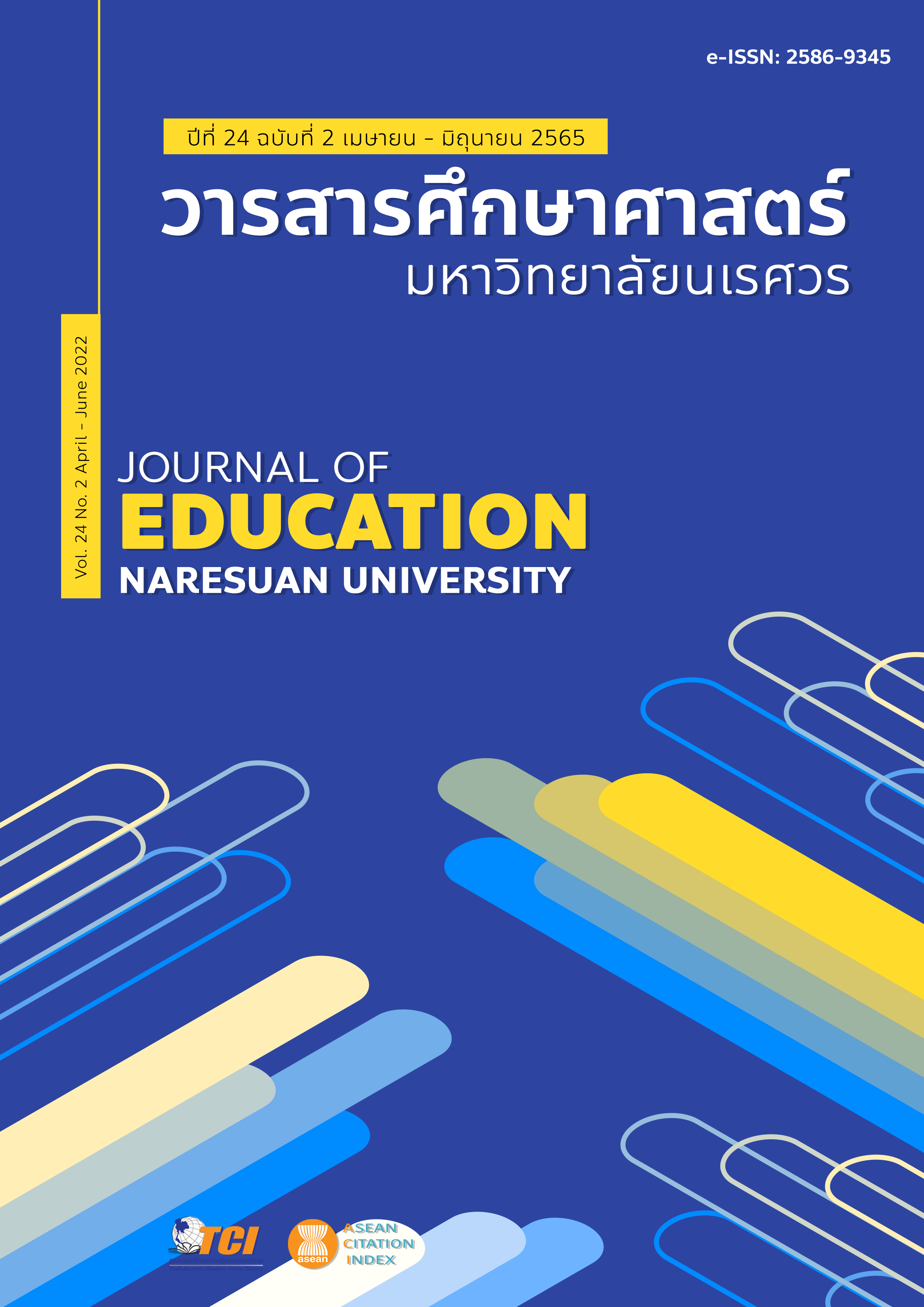EFFECT OF INQUIRY INSTRUCTION AND GAMES ON STUDENTS' CLIMATE LITERACY ผลของการจัดการเรียนรู้แบบสืบสอบร่วมกับการใช้เกมต่อการรู้สภาพภูมิอากาศของนักเรียน
Main Article Content
Abstract
Climate change becomes, nowadays, a challenging issue. World citizens need to move forward with a thorough insight into the various risks that may be arisen from climate change. This study focuses on developing students’ climate literacy at the climate attentive level using inquiry instruction and games. Target group are 33 seventh-grade students from the public school of the vulnerable agricultural community context in Nan, Thailand adopting purposive sampling to join a six-weeks science course. The data of the understanding test and awareness questionnaire in the ratio 1:1; percentage scores were analyzed using the paired independent t-test after learning by inquiry instruction and games. Results showed that there is a statistically significant (p<.05) differences between pre and post climate literacy scores and climate literacy level. It is indicated that the use of inquiry instruction and games had a thorough effect on students’ climate literacy development. Besides, community cases should be carefully considered to facilitate to encourage students’ decision making.
Article Details

This work is licensed under a Creative Commons Attribution-NonCommercial-NoDerivatives 4.0 International License.
The owner of the article does not copy or violate any of its copyright. If any copyright infringement occurs or prosecution, in any case, the Editorial Board is not involved in all the rights to the owner of the article to be performed.
References
Azevedo, J., & Marques, M. (2017). Climate literacy: a systematic review and model integration. International Journal of Global Warming, 12(3-4), 414-430. doi:10.1504/IJGW.2017.084789
Bedford, D. (2016). Does climate literacy matter? A case study of US students’ level of concern about anthropogenic global warming. Journal of Geography, 115(5), 187-197.
Bush, D., Sieber, R., Seiler, G., & Chandler, M. (2017). University-level teaching of Anthropogenic Global Climate Change (AGCC) via student inquiry. Studies in Science Education, 53(2), 113-136.
Bybee, R. W., Taylor, J. A., Gardner, A., Van Scotter, P., Powell, J. C., Westbrook, A., & Landes, N. (2006). The BSCS 5E instructional model: Origins and effectiveness. Colorado Springs, 5, 88-98.
Castek, J., & Dwyer, B. (2018). Think globally, act locally: Teaching climate change through digital inquiry. The Reading Teacher, 71(6), 755-761.
Deng, Y., Wang, M., & Yousefpour, R. (2017). How do people's perceptions and climatic disaster experiences influence their daily behaviors regarding adaptation to climate change? - A case study among young generations. Science of the total environment, 581, 840-847.
Drewes, A., Henderson, J., & Mouza, C. (2018). Professional development design considerations in climate change education: teacher enactment and student learning. International Journal of Science Education, 40(1), 67-89.
Fung, M. K., Tedesco, L. R., & Katz, M. E. (2015). Games and climate literacy. Nature Geoscience, 8(8), 576.
GCRP. (2009). Climate literacy: the essential principles of climate science. US Global Change Research Program.
Hansen, A., Schneider, K., & Lange, J. (2018). Games for knowledge transfer and as a stimulus for climate change mitigation in agriculture—Lessons learned from a game prototype. In Handbook of Climate Change Communication: Vol. 3 (pp. 197-208): Springer.
McNeal, K. S., Miller, H. R., & Herbert, B. E. (2008). The effect of using inquiry and multiple representations on introductory geology students' conceptual model development of coastal eutrophication. Journal of Geoscience Education, 56(3), 201-211.
McNeill, K. L., & Vaughn, M. H. (2012). Urban high school students’ critical science agency: Conceptual understandings and environmental actions around climate change. Research in Science Education, 42(2), 373-399.
Ministry of Agriculture and Cooperatives. (2019). Area used in agriculture by province, year 2013. Retrieved from http://oldweb.oae.go.th/download/use_soilNew/soiNew/landused2556.html. [in Thai]
Ministry of Education. (2017). Indicators and learning subjects in the core of science learning subject groups (Revised Edition B.E. 2560). Retrieved from http://academic.obec.go.th/newsdetail.php?id=75 [in Thai]
Minner, D. D., Levy, A. J., & Century, J. (2010). Inquiry‐based science instruction—what is it and does it matter? Results from a research synthesis years 1984 to 2002. Journal of Research in Science Teaching, 47(4), 474-496.
Nan Provincial Education Office. (2018). Rak Pa Nan Course. Retrieved from https://drive.google.com/file/d/1XQ2oBFtXS2ECrFXAla158n3cviPz-sYm/view [in Thai]
Nations, U. (2015). United nations framework convention on climate change. Retrieved 20 October 2018, from United Nations https://unfccc.int/resource/docs/convkp/conveng.pdf.
Niepold, F., Herring, D., & McConville, D. (2007). The case for climate literacy in the 21st Century. Paper presented at the 5th International Symposium on Digital Earth.
Office of Natural Resources and Environmental Policy and Planning (ONEP). (2015). Climate change master plan 2015-2050. Retrieved from shorturl.at/aTUYZ [in Thai]
Office of Natural Resources and Environmental Policy and Planning (ONEP). (2018). Database for Thailand’s environmental quality situation report. Retrieved from http://www.onep.go.th/env_data/ [in Thai]
Quiroga, S., Suárez, C., & Solís, J. D. (2015). Exploring coffee farmers’ awareness about climate change and water needs: Smallholders’ perceptions of adaptive capacity. Environmental Science & Policy, 45, 53-66.
Reckien, D., & Eisenack, K. (2013). Climate change gaming on board and screen: A review. Simulation Gaming, 44(2-3), 253-271.
Royal Forest Department. (2018). Forest area of Thailand year 1973-2017. Retrieved from http://forestinfo.forest.go.th/55/Content.aspx?id=72
The Institute for the Promotion of Teaching Science and Technology (ISPT). (2011). Earth Science Course (ESS). Retrieved from https://www.scimath.org/article-physics/item/596-ess [in Thai]
UNESCO. (2010). Climate change education for sustainable development. Retrieved from https://unesdoc.unesco.org/ark:/48223/pf0000190101


